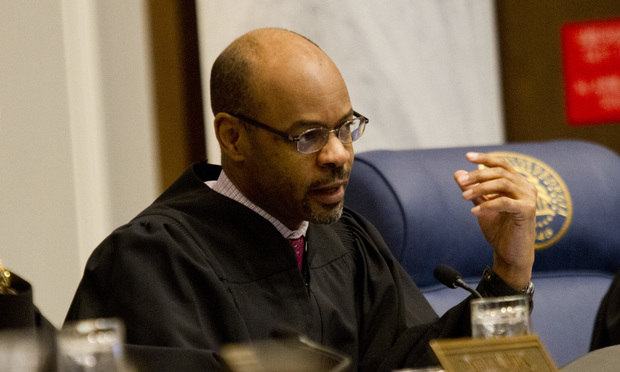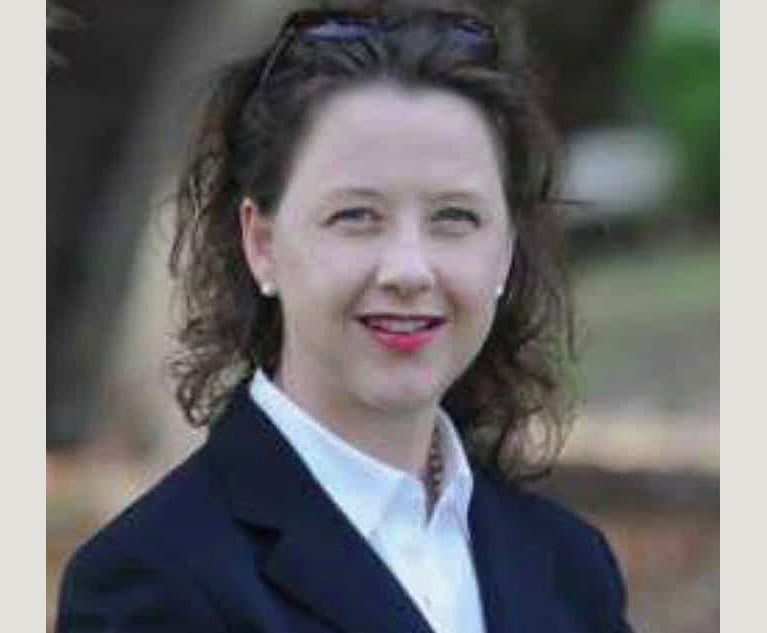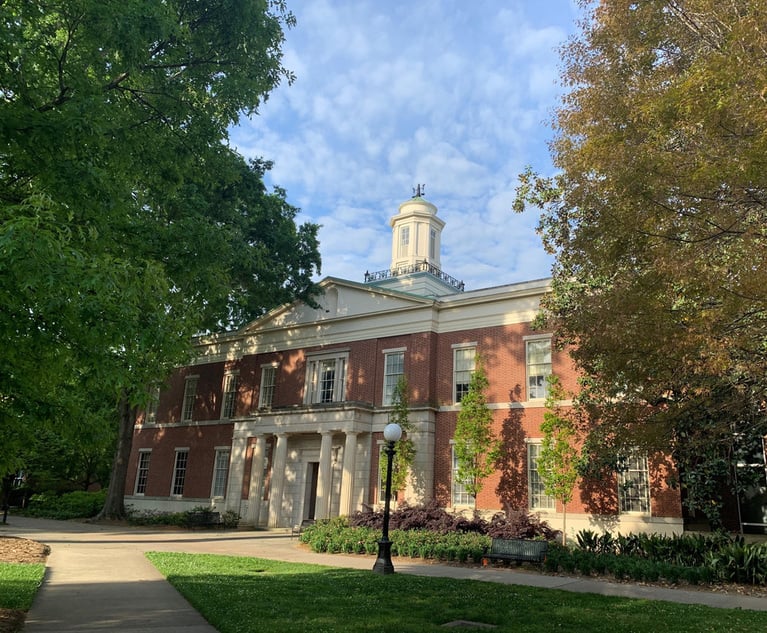After Pushing for Abortion, Biological Father Loses Paternity Case at Georgia Supreme Court
"It appears to me that an offer to pay for an abortion is highly probative of a lack of intent to parent the child," one justice wrote.
May 18, 2020 at 04:50 PM
5 minute read
 Chief Justice Harold Melton, Supreme Court of Georgia. (Photo: John Disney/ALM)
Chief Justice Harold Melton, Supreme Court of Georgia. (Photo: John Disney/ALM)
The Supreme Court of Georgia ruled Monday that a trial judge was right to deny paternity rights to a biological father who offered to pay for the mother's abortion.
The 6-3 majority ruling reverses the Georgia Court of Appeals, which held in 2018 that a Habersham County Superior Court judge was wrong to reject Joshua Brumbelow's efforts to claim the boy as his son—who was born after a one-night stand with the mother, who was married to someone else but separated.
In an opinion rich with footnotes often critical of both the appeals court and dissenting justices, Chief Justice Harold Melton wrote that Brumbelow had effectively abandoned his right, known as an "opportunity interest," to assert paternity and that the trial court was within its discretion to deny Brumbelow's petition.
The majority also held that the Court of Appeals was wrong to conclude the trial court should have based its ruling on whether Brumbelow was a fit parent rather than whether affirming his paternity was in the best interest of the child. The majority also said that portion of the appeals court's 2018 opinion "should be viewed as dicta only."
Melton criticized the appeals court for basing its ruling on an analysis of evidence never mentioned by the trial court, including testimony and other evidence that Melton's opinion said the trial court "was entitled to discredit or afford no significant weight."
In one footnote, Melton emphasized "the deference that appellate courts must give to trial courts with regard to findings of fact supported by the evidence," adding a reminder that appellate courts are "not to engage in the inappropriate practice of making independent findings."
In a concurrence, Justice Charles Bethel said there was "clearly evidence in the record" to support a finding that Brumbelow abandoned his paternity rights.
"It appears to me that an offer to pay for an abortion is highly probative of a lack of intent to parent the child," Bethel wrote. "Of course, hearts and minds change and the lack of an interest in parenting at the outset of a pregnancy can give way to genuine parental concern, nurture, and love. But, whether such a change has occurred is patently the sort of question appellate courts routinely leave to trial courts to resolve."
Writing for the dissent, Justice Nels Peterson, argued that he and Justices John Ellington and Keith Blackwell did not believe the case was worthy of review, and that it was not clear the appeals court erred.
But Melton pushed back, writing, "We granted certiorari in this case to correct the Court of Appeals' misunderstanding and misapplication of the applicable standard of review."
The appeals court opinion was written by Chief Judge Stephen Dillard. Judges Amanda Mercier and Sara Doyle concurred.
Melton also took issue with the dissenting justices. "The dissent contends that we have not sufficiently recognized the ability of appellate courts to notice some undisputed facts not recognized by the trial court," he said. "This is untrue. While an appellate court can properly take notice of the undisputed facts … appellate courts cannot use those undisputed facts to make alternative findings of fact that are contrary to those explicitly or implicitly made by the trial court where other evidence exists that supports the trial court's findings."
Justin Hester and partner James Outman of Atlanta's Hester Outman represent the mother, Jeannie Mathenia, and the prospective adoptive parents. Hester said Monday that Melton's opinion clarifies the issue of what constitutes an abandonment of opportunity in the context of a paternity dispute.
"I'm hopeful it means we can finalize the adoption," Hester said.
"Our main contention was the Court of Appeals retried the case," Outman added.
Outman said Monday's ruling is the first time the Supreme Court has examined the "opportunity interest" doctrine in a legitimation case and has clarified the law by making clear that opportunity interest begins at conception.
Brumbelow's lawyers, Toccoa attorney Timothy Paul Healy and Cornelia lawyers Thomas Hatchett and Dennis Cathey of Cathey & Strain, couldn't be reached for comment.
The majority opinion said that, when Mathenia first notified Brumbelow she was pregnant, he denied the child was his, eventually joining her at one of her doctor appointments "in order to find out whether he could be the father." After offering to pay for an abortion, "he did not visit her, inquire about her well-being, or offer her any emotional or financial support" although he was employed and capable of doing so.
Brumbelow filed a legitimation petition after his mother got in touch with Mathenia after the baby was given up for adoption, and invited Mathenia to meet with Brumbelow and his attorney.
Four more months passed before Brumbelow asked to visit the child, a request he made once through his lawyer, Melton wrote.
"The fact that Brumbelow's mother communicated with Mathenia after [the baby's] birth does not demonstrate Brumbelow's efforts to pursue a relationship with his child," he said.
And, Melton added, "The dissent's statement that the undisputed evidence showed that Mathenia 'did not want the biological father to contact her' is belied by the record, and it cannot be used as a basis for making a finding contrary to the ones made by the trial court."
"It was for the superior court to determine how to view the mother's statements and what weight to give them in relation to Brumbelow's efforts (or lack thereof) to contact her and provide support," Melton concluded.
This content has been archived. It is available through our partners, LexisNexis® and Bloomberg Law.
To view this content, please continue to their sites.
Not a Lexis Subscriber?
Subscribe Now
Not a Bloomberg Law Subscriber?
Subscribe Now
NOT FOR REPRINT
© 2025 ALM Global, LLC, All Rights Reserved. Request academic re-use from www.copyright.com. All other uses, submit a request to [email protected]. For more information visit Asset & Logo Licensing.
You Might Like
View All

Ex-Prosecutor’s Trial Ends as Judge Throws Out Her Felony Indictment in Ahmaud Arbery Death Case


Ex-Prosecutor Denies on Witness Stand That She Tried to Protect Ahmaud Arbery's Killers
Trending Stories
- 1Thursday Newspaper
- 2Public Notices/Calendars
- 3Judicial Ethics Opinion 24-117
- 4Rejuvenation of a Sharp Employer Non-Compete Tool: Delaware Supreme Court Reinvigorates the Employee Choice Doctrine
- 5Mastering Litigation in New York’s Commercial Division Part V, Leave It to the Experts: Expert Discovery in the New York Commercial Division
Who Got The Work
J. Brugh Lower of Gibbons has entered an appearance for industrial equipment supplier Devco Corporation in a pending trademark infringement lawsuit. The suit, accusing the defendant of selling knock-off Graco products, was filed Dec. 18 in New Jersey District Court by Rivkin Radler on behalf of Graco Inc. and Graco Minnesota. The case, assigned to U.S. District Judge Zahid N. Quraishi, is 3:24-cv-11294, Graco Inc. et al v. Devco Corporation.
Who Got The Work
Rebecca Maller-Stein and Kent A. Yalowitz of Arnold & Porter Kaye Scholer have entered their appearances for Hanaco Venture Capital and its executives, Lior Prosor and David Frankel, in a pending securities lawsuit. The action, filed on Dec. 24 in New York Southern District Court by Zell, Aron & Co. on behalf of Goldeneye Advisors, accuses the defendants of negligently and fraudulently managing the plaintiff's $1 million investment. The case, assigned to U.S. District Judge Vernon S. Broderick, is 1:24-cv-09918, Goldeneye Advisors, LLC v. Hanaco Venture Capital, Ltd. et al.
Who Got The Work
Attorneys from A&O Shearman has stepped in as defense counsel for Toronto-Dominion Bank and other defendants in a pending securities class action. The suit, filed Dec. 11 in New York Southern District Court by Bleichmar Fonti & Auld, accuses the defendants of concealing the bank's 'pervasive' deficiencies in regards to its compliance with the Bank Secrecy Act and the quality of its anti-money laundering controls. The case, assigned to U.S. District Judge Arun Subramanian, is 1:24-cv-09445, Gonzalez v. The Toronto-Dominion Bank et al.
Who Got The Work
Crown Castle International, a Pennsylvania company providing shared communications infrastructure, has turned to Luke D. Wolf of Gordon Rees Scully Mansukhani to fend off a pending breach-of-contract lawsuit. The court action, filed Nov. 25 in Michigan Eastern District Court by Hooper Hathaway PC on behalf of The Town Residences LLC, accuses Crown Castle of failing to transfer approximately $30,000 in utility payments from T-Mobile in breach of a roof-top lease and assignment agreement. The case, assigned to U.S. District Judge Susan K. Declercq, is 2:24-cv-13131, The Town Residences LLC v. T-Mobile US, Inc. et al.
Who Got The Work
Wilfred P. Coronato and Daniel M. Schwartz of McCarter & English have stepped in as defense counsel to Electrolux Home Products Inc. in a pending product liability lawsuit. The court action, filed Nov. 26 in New York Eastern District Court by Poulos Lopiccolo PC and Nagel Rice LLP on behalf of David Stern, alleges that the defendant's refrigerators’ drawers and shelving repeatedly break and fall apart within months after purchase. The case, assigned to U.S. District Judge Joan M. Azrack, is 2:24-cv-08204, Stern v. Electrolux Home Products, Inc.
Featured Firms
Law Offices of Gary Martin Hays & Associates, P.C.
(470) 294-1674
Law Offices of Mark E. Salomone
(857) 444-6468
Smith & Hassler
(713) 739-1250






